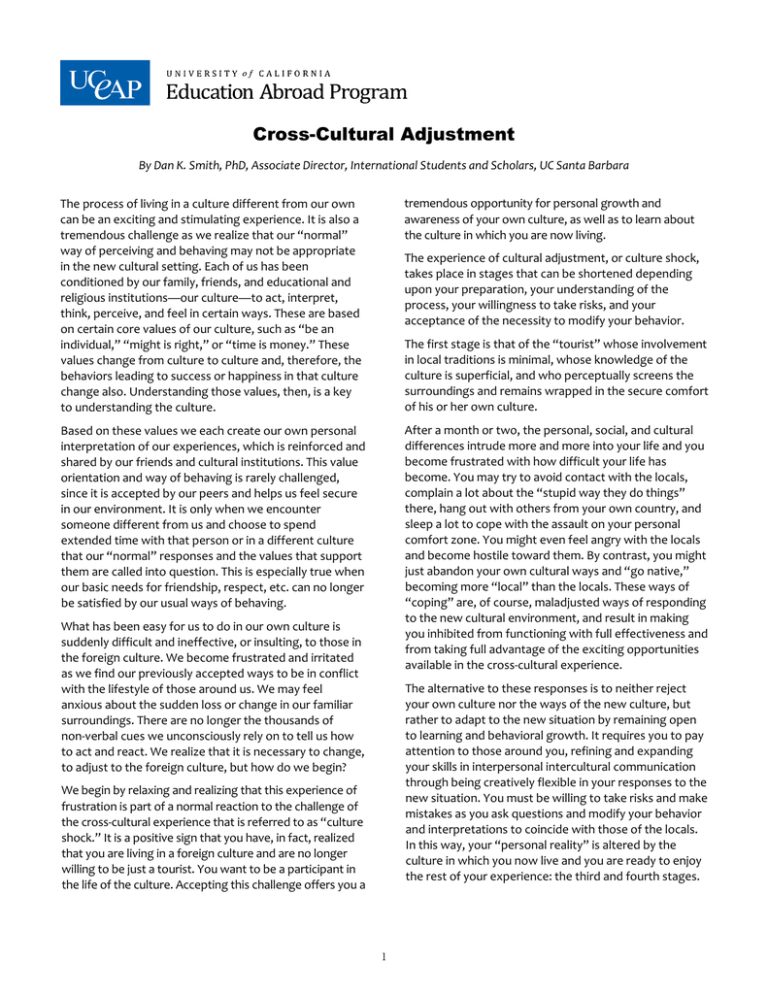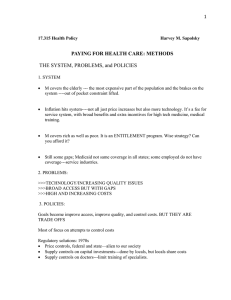Cross-Cultural Adjustment
advertisement

Cross-Cultural Adjustment By Dan K. Smith, PhD, Associate Director, International Students and Scholars, UC Santa Barbara The process of living in a culture different from our own can be an exciting and stimulating experience. It is also a tremendous challenge as we realize that our “normal” way of perceiving and behaving may not be appropriate in the new cultural setting. Each of us has been conditioned by our family, friends, and educational and religious institutions—our culture—to act, interpret, think, perceive, and feel in certain ways. These are based on certain core values of our culture, such as “be an individual,” “might is right,” or “time is money.” These values change from culture to culture and, therefore, the behaviors leading to success or happiness in that culture change also. Understanding those values, then, is a key to understanding the culture. tremendous opportunity for personal growth and awareness of your own culture, as well as to learn about the culture in which you are now living. Based on these values we each create our own personal interpretation of our experiences, which is reinforced and shared by our friends and cultural institutions. This value orientation and way of behaving is rarely challenged, since it is accepted by our peers and helps us feel secure in our environment. It is only when we encounter someone different from us and choose to spend extended time with that person or in a different culture that our “normal” responses and the values that support them are called into question. This is especially true when our basic needs for friendship, respect, etc. can no longer be satisfied by our usual ways of behaving. After a month or two, the personal, social, and cultural differences intrude more and more into your life and you become frustrated with how difficult your life has become. You may try to avoid contact with the locals, complain a lot about the “stupid way they do things” there, hang out with others from your own country, and sleep a lot to cope with the assault on your personal comfort zone. You might even feel angry with the locals and become hostile toward them. By contrast, you might just abandon your own cultural ways and “go native,” becoming more “local” than the locals. These ways of “coping” are, of course, maladjusted ways of responding to the new cultural environment, and result in making you inhibited from functioning with full effectiveness and from taking full advantage of the exciting opportunities available in the cross‐cultural experience. The experience of cultural adjustment, or culture shock, takes place in stages that can be shortened depending upon your preparation, your understanding of the process, your willingness to take risks, and your acceptance of the necessity to modify your behavior. The first stage is that of the “tourist” whose involvement in local traditions is minimal, whose knowledge of the culture is superficial, and who perceptually screens the surroundings and remains wrapped in the secure comfort of his or her own culture. What has been easy for us to do in our own culture is suddenly difficult and ineffective, or insulting, to those in the foreign culture. We become frustrated and irritated as we find our previously accepted ways to be in conflict with the lifestyle of those around us. We may feel anxious about the sudden loss or change in our familiar surroundings. There are no longer the thousands of non‐verbal cues we unconsciously rely on to tell us how to act and react. We realize that it is necessary to change, to adjust to the foreign culture, but how do we begin? The alternative to these responses is to neither reject your own culture nor the ways of the new culture, but rather to adapt to the new situation by remaining open to learning and behavioral growth. It requires you to pay attention to those around you, refining and expanding your skills in interpersonal intercultural communication through being creatively flexible in your responses to the new situation. You must be willing to take risks and make mistakes as you ask questions and modify your behavior and interpretations to coincide with those of the locals. In this way, your “personal reality” is altered by the culture in which you now live and you are ready to enjoy the rest of your experience: the third and fourth stages. We begin by relaxing and realizing that this experience of frustration is part of a normal reaction to the challenge of the cross‐cultural experience that is referred to as “culture shock.” It is a positive sign that you have, in fact, realized that you are living in a foreign culture and are no longer willing to be just a tourist. You want to be a participant in the life of the culture. Accepting this challenge offers you a 1 With regard to some practical skills and attitudes to develop as you approach and participate in the cross‐ cultural experience, there are some excellent books on the subject. Some of the Campus EAP Offices have additional information sheets, and some UC campuses offer courses in which you can learn and practice these abilities. By the third stage of the process, after about four months in the foreign country, your language skills are increasing, you are learning the local traditions and customs, and you are able to make friends with the local people as your understanding and sensitivity take the place of criticism and judgment. Finally, during the fourth stage, you have developed meaningful ways of coping with the stresses that are placed upon you by cultural differences. You can derive pleasure from the relationships you have and give meaning to experiences in ways that are relevant to others as well as yourself. You are a full participant in the culture and are reluctant to think about going “home,” where you will begin the process all over again in the form of “reentry shock.” The basis of all positive adjustment is intercultural communication. That is the process of communicating with sensitivity and paying attention to the differences in values and behaviors of those with whom you communicate, realizing that it is important to “listen” with all your senses and assume you have not completely understood or been understood unless you have explored each other’s meanings in a spirit of mutual respect and acceptance. In this way, interaction in an atmosphere of supportiveness and trust will foster meaningful communication and friendship. But don’t worry; you have had plenty of practice adjusting to change! 2

